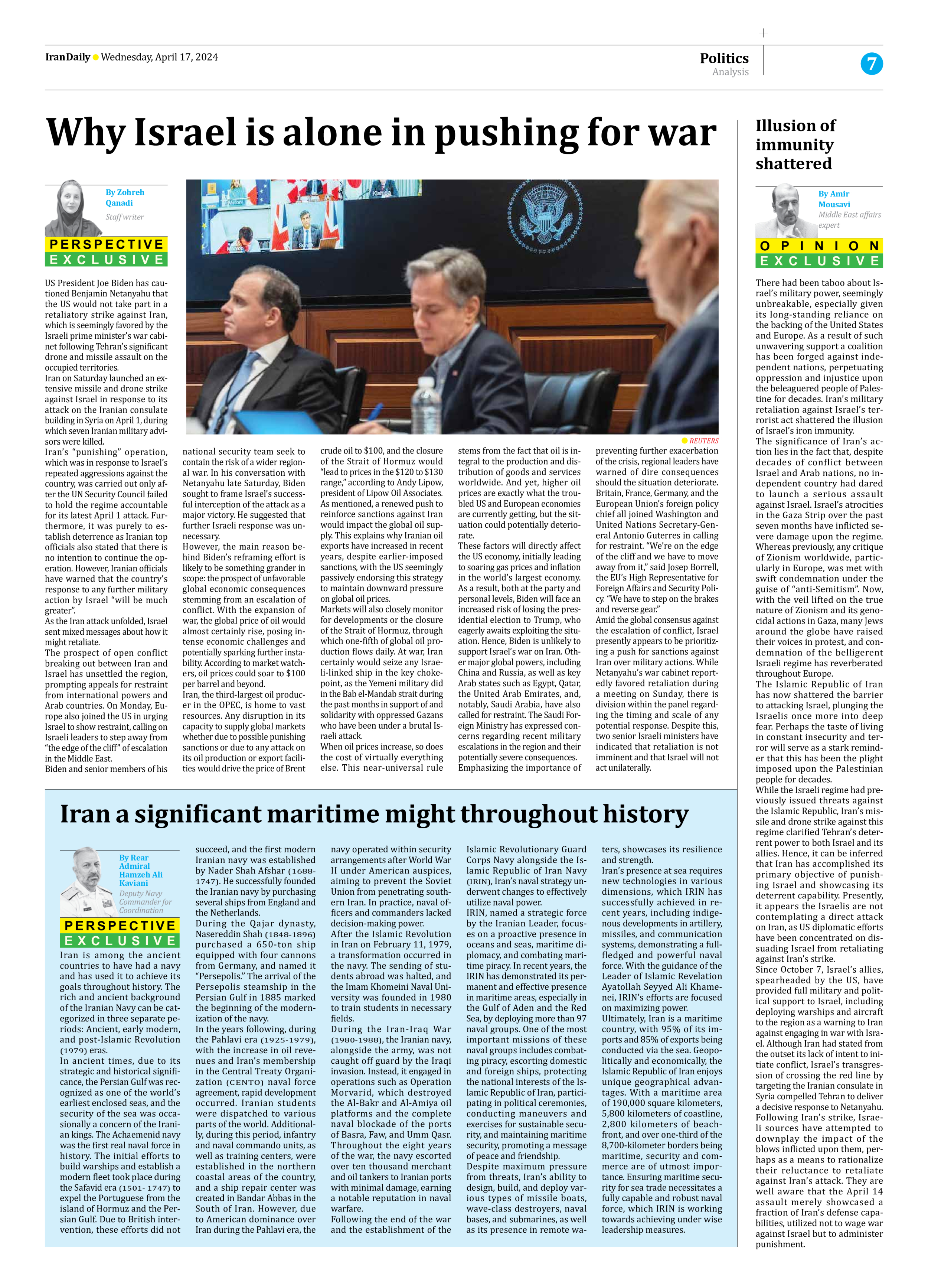
Why Israel is alone in pushing for war
By Zohreh Qanadi
Staff writer
US President Joe Biden has cautioned Benjamin Netanyahu that the US would not take part in a retaliatory strike against Iran, which is seemingly favored by the Israeli prime minister’s war cabinet following Tehran’s significant drone and missile assault on the occupied territories.
Iran on Saturday launched an extensive missile and drone strike against Israel in response to its attack on the Iranian consulate building in Syria on April 1, during which seven Iranian military advisors were killed.
Iran’s “punishing” operation, which was in response to Israel’s repeated aggressions against the country, was carried out only after the UN Security Council failed to hold the regime accountable for its latest April 1 attack. Furthermore, it was purely to establish deterrence as Iranian top officials also stated that there is no intention to continue the operation. However, Iranian officials have warned that the country’s response to any further military action by Israel “will be much greater”.
As the Iran attack unfolded, Israel sent mixed messages about how it might retaliate.
The prospect of open conflict breaking out between Iran and Israel has unsettled the region, prompting appeals for restraint from international powers and Arab countries. On Monday, Europe also joined the US in urging Israel to show restraint, calling on Israeli leaders to step away from “the edge of the cliff” of escalation in the Middle East.
Biden and senior members of his national security team seek to contain the risk of a wider regional war. In his conversation with Netanyahu late Saturday, Biden sought to frame Israel’s successful interception of the attack as a major victory. He suggested that further Israeli response was unnecessary.
However, the main reason behind Biden’s reframing effort is likely to be something grander in scope: the prospect of unfavorable global economic consequences stemming from an escalation of conflict. With the expansion of war, the global price of oil would almost certainly rise, posing intense economic challenges and potentially sparking further instability. According to market watchers, oil prices could soar to $100 per barrel and beyond.
Iran, the third-largest oil producer in the OPEC, is home to vast resources. Any disruption in its capacity to supply global markets whether due to possible punishing sanctions or due to any attack on its oil production or export facilities would drive the price of Brent crude oil to $100, and the closure of the Strait of Hormuz would “lead to prices in the $120 to $130 range,” according to Andy Lipow, president of Lipow Oil Associates.
As mentioned, a renewed push to reinforce sanctions against Iran would impact the global oil supply. This explains why Iranian oil exports have increased in recent years, despite earlier-imposed sanctions, with the US seemingly passively endorsing this strategy to maintain downward pressure on global oil prices.
Markets will also closely monitor for developments or the closure of the Strait of Hormuz, through which one-fifth of global oil production flows daily. At war, Iran certainly would seize any Israeli-linked ship in the key chokepoint, as the Yemeni military did in the Bab el-Mandab strait during the past months in support of and solidarity with oppressed Gazans who have been under a brutal Israeli attack.
When oil prices increase, so does the cost of virtually everything else. This near-universal rule stems from the fact that oil is integral to the production and distribution of goods and services worldwide. And yet, higher oil prices are exactly what the troubled US and European economies are currently getting, but the situation could potentially deteriorate.
These factors will directly affect the US economy, initially leading to soaring gas prices and inflation in the world’s largest economy. As a result, both at the party and personal levels, Biden will face an increased risk of losing the presidential election to Trump, who eagerly awaits exploiting the situation. Hence, Biden is unlikely to support Israel’s war on Iran. Other major global powers, including China and Russia, as well as key Arab states such as Egypt, Qatar, the United Arab Emirates, and, notably, Saudi Arabia, have also called for restraint. The Saudi Foreign Ministry has expressed concerns regarding recent military escalations in the region and their potentially severe consequences.
Emphasizing the importance of preventing further exacerbation of the crisis, regional leaders have warned of dire consequences should the situation deteriorate. Britain, France, Germany, and the European Union’s foreign policy chief all joined Washington and United Nations Secretary-General Antonio Guterres in calling for restraint. “We’re on the edge of the cliff and we have to move away from it,” said Josep Borrell, the EU’s High Representative for Foreign Affairs and Security Policy. “We have to step on the brakes and reverse gear.”
Amid the global consensus against the escalation of conflict, Israel presently appears to be prioritizing a push for sanctions against Iran over military actions. While Netanyahu’s war cabinet reportedly favored retaliation during a meeting on Sunday, there is division within the panel regarding the timing and scale of any potential response. Despite this, two senior Israeli ministers have indicated that retaliation is not imminent and that Israel will not act unilaterally.







